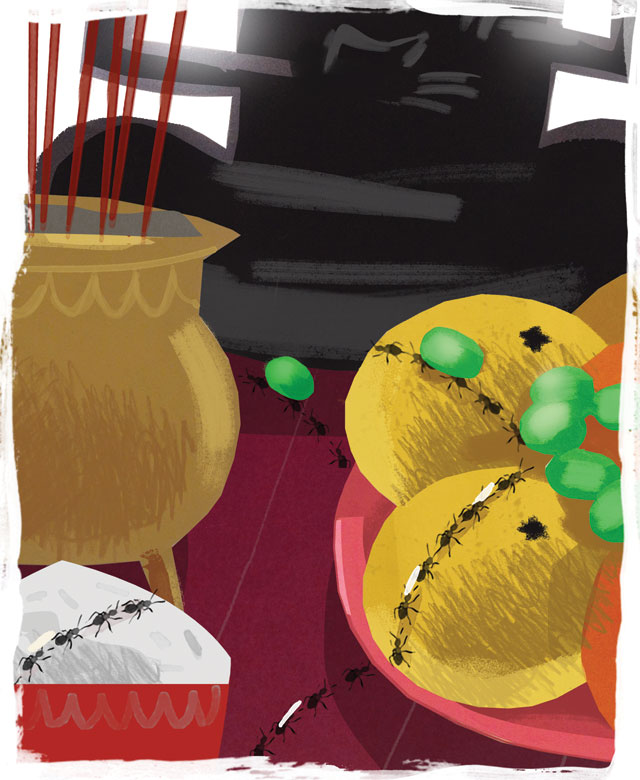The latest part of a Southeast Asia Globe series that shines a light on the region’s finest poetry
Compiled by Nathan A. Thompson Illustration by Oliver Raw
Drawing on the research of Professor Suchitra Chongstitvatana and her work on the influence of Buddhist philosophy on contemporary Thai poetry, this month we look at two female Thai poets writing about the Buddhist experience. Thai Buddhist poems are traditionally didactic, and these two draw from that tradition but depart from it by dropping the sermon in favour of images.

Chomchand is a literary critic and novelist. The poem “Voices of the Night” comes from her 1998 collection Dawn in the Night and opens with a description of beauty and stillness in the nighttime forest. The narrator is rapt in “the radiant world” but she soon becomes disturbed. The next few stanzas are full of noise: sobbing, screaming and laughing. At first the narrator is not sure of their source: “Whose heart is crying?” she wonders. But then, in the penultimate paragraph, she realises that “my heart is making noises”. Rather than loathe her noisy heart, she listens without judgment – a core part of Buddhist philosophy – and realises, through the juxtaposition in the final stanza, that she always listens to “surrounding people” but never to her own “inner voices”.
Chamnongsri Rutnin is a playwright and translator, and her poem “Black Ants” is from her 1997 collection titled Under Rain and Thunder. “Black Ants” is a contemplation on human life and flux. The ants are a metaphor for human beings, the majority of whom go through life following others, “tired, exhausted, so serious… never ask questions”. For many Buddhists, the majority of people are lost in ignorance of their true nature and this belief is reflected upon in the final line: “Maybe just a very few / Know their destination!” The ants also represent the constant flux of reality. They are compared to a “bursting black stream”, an image that contains the paradox that, even though some may be aware of their situation, all are swept along by nature’s grand movements.
“Voices of the Night”
by Chomchand
Softly smoothly the voice echoes
The leaves are falling to sleep
Hush! Listen to the earth
Fading, aching petals are dying
Crying heart-rending tears!
Young pure petals are blossoming
Listen to their joyous melodies!
What magic of divine Nature
The radiant world is descending!
The voices of the World are magical
Close your eyes, savouring the Divine!
Whose sobbing is that
Echoing in the quiet night?
Coming and going… so far away
Whispering of the Night!
Listen whose heart is crying?
Listen what screaming noise
Listen what joyous laughing
Where are they all from?
Now come, listen again
Listen to myriads of new voices
The night and the World is passing us
My heart is making noises
Mostly I listen to surrounding people
Mostly I try to give answers
Mostly I enjoy hearing others
Yet never listen to my inner voices!
***
“Black Ants”
by Chamnongsri Rutnin
Yesterday millions of black ants
Migrate like bursting of a black stream
At dawn the stream looks so fierce
Afternoon it is still strong
At dusk on the meditation path
The stream becomes so tiny
Winding like a dry waterway
From where, to where who knows
Among the millions,
How many know their destination
Just following others
Where does that end, they don’t know
Tired, exhausted, so serious
Never ask questions
Just pushing forward
With all their might
Maybe just a very few
Know their destination!
